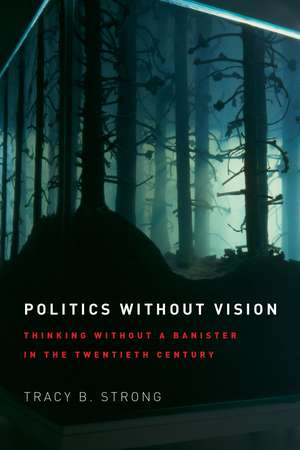Politics without Vision: Thinking without a Banister in the Twentieth Century
Autor Tracy B. Strongen Limba Engleză Paperback – 17 oct 2013
Politics without Vision takes up the thought of seven influential thinkers, each of whom attempted to construct a political solution to this problem: Nietzsche, Weber, Freud, Lenin, Schmitt, Heidegger, and Arendt. None of these theorists were liberals nor, excepting possibly Arendt, were they democrats—and some might even be said to have served as handmaidens to totalitarianism. And all to a greater or lesser extent shared the common conviction that the institutions and practices of liberalism are inadequate to the demands and stresses of the present times. In examining their thought, Strong acknowledges the political evil that some of their ideas served to foster but argues that these were not necessarily the only paths their explorations could have taken. By uncovering the turning points in their thought—and the paths not taken—Strong strives to develop a political theory that can avoid, and perhaps help explain, the mistakes of the past while furthering the democratic impulse.
Confronting the widespread belief that political thought is on the decline, Strong puts forth a brilliant and provocative counterargument that in fact it has endured—without the benefit of outside support. A compelling rendering of contemporary political theory, Politics without Vision is sure to provoke discussion among scholars in many fields.
Preț: 253.79 lei
Nou
Puncte Express: 381
Preț estimativ în valută:
48.57€ • 50.52$ • 40.10£
48.57€ • 50.52$ • 40.10£
Carte tipărită la comandă
Livrare economică 14-28 aprilie
Preluare comenzi: 021 569.72.76
Specificații
ISBN-13: 9780226104294
ISBN-10: 022610429X
Pagini: 424
Ilustrații: 7 halftones
Dimensiuni: 152 x 229 x 28 mm
Greutate: 0.59 kg
Editura: University of Chicago Press
Colecția University of Chicago Press
ISBN-10: 022610429X
Pagini: 424
Ilustrații: 7 halftones
Dimensiuni: 152 x 229 x 28 mm
Greutate: 0.59 kg
Editura: University of Chicago Press
Colecția University of Chicago Press
Notă biografică
Tracy B. Strong is distinguished professor in the Department of Political Science at the University of California, San Diego. He is a former editor of Political Theory and the author or editor of many books, including Friedrich Nietzsche and the Politics of Transfiguration, Jean-Jacques Rousseau and the Politics of the Ordinary, and The Many and the One: Religious and Secular Perspectives on Ethical Pluralism in the Modern World.
Cuprins
PREFACE AND ACKNOWLEDGMENTS
NOTE ON SOURCES AND ABBREVIATIONS
INTRODUCTION
The World as We Find It
ONE
Kant and the Death of God
TWO
Nietzsche: The Tragic Ethos and the Spirit of Music
THREE
Max Weber, Magic, and the Politics of Social Scientific Objectivity
INTERLUDE
“What Have We to Do with Morals?” Nietzsche and Weber on the Politics of Morality
FOUR
Sigmund Freud and the Heroism of Knowledge
FIVE
Lenin and the Calling of the Party
SIX
Carl Schmitt and the Exceptional Sovereign
SEVEN
Martin Heidegger and the Space of the Political
EIGHT
Without a Banister: Hannah Arendt and Roads Not Taken
NINE
Conclusion: The World as It Finds Us
NOTES
INDEX
Recenzii
“An outstanding study of twentieth-century political thought, conceptually challenging but accessibly written. Strong's unmistakable voice is at once lyrical and sober, and Politics without Vision is erudite and illuminating at every turn.”
“This is an important book that has needed to be written, that Tracy Strong is perhaps uniquely positioned to write, and that some of us have been waiting for him to write for a long time. He does so expertly and knowledgeably with an astonishing grasp of a rich variety of texts.”
“What does it mean to ‘think without a banister,’ without the support of the certitudes previously supplied by religion, science, and the philosophy of history? In Politics without Vision, Tracy B. Strong provides a remarkable and searching survey of the responses given by seven twentieth-century thinkers as they struggled to articulate the relation between morality and politics in a post-Christian, post-Enlightenment, and post-historicist world. The results are both surprising and bracing, moving judgment, decision, and action into the space previously occupied by falsely systemic accounts of the relation between theory and practice.”
“A marvelous tour de force brimming with intellectual excitement. With extraordinarily impressive scholarship, Tracy B. Strong carefully constructs the historical context of each of the thinkers he engages, while simultaneously keeping a laser-like focus on the urgent goal of accumulating pieces to the puzzle as to what sense we might be able to give to ‘the political’ in a world where we must think, as Arendt said, ‘without banisters.’ A book not to be missed.”
“I’ve been waiting for this book all my life. If Strong’s aim is to look on the past with new eyes, then he is undoubtedly successful. Each chapter provides a heady mixture of intellectual energy, scholarly passion, and fresh perspectives. And, like all good books, it raises as many questions as it answers. . . . This is a book that demonstrates Strong’s rare gift for discussing complex issues in an accessible manner, and his capacity for bridging ‘politics as theory’ and ‘politics as practice.’”
“A magisterial exploration of solutions to what Tracy Strong sees as one of the key philosophical and political problems of modernity: the unavailability of authoritative foundations for knowledge and action. Politics withoutVision is a frequently surprising treatment of major political thinkers.”
"Tracy Strong, eminent interpreter of Rousseau and Nietzsche, has delivered, with his Politics without Vision: Thinking without a Banister in the Twentieth Century, a learned, wonderfully measured, insightful consideration of a number of twentieth-century authors—and two important antecedents in Kant and Nietzsche—motivated by the hope that they can supply some guidance for us today as we endeavor to think about politics."
